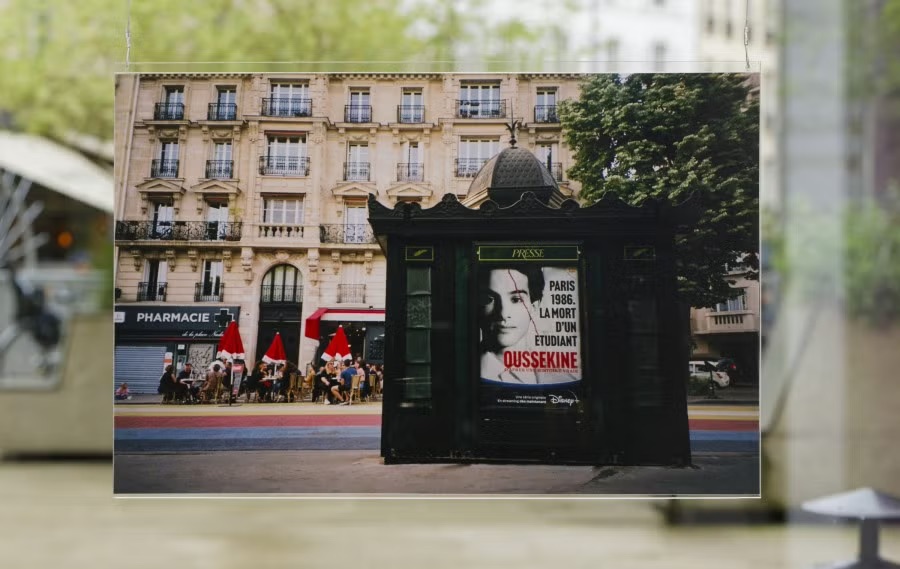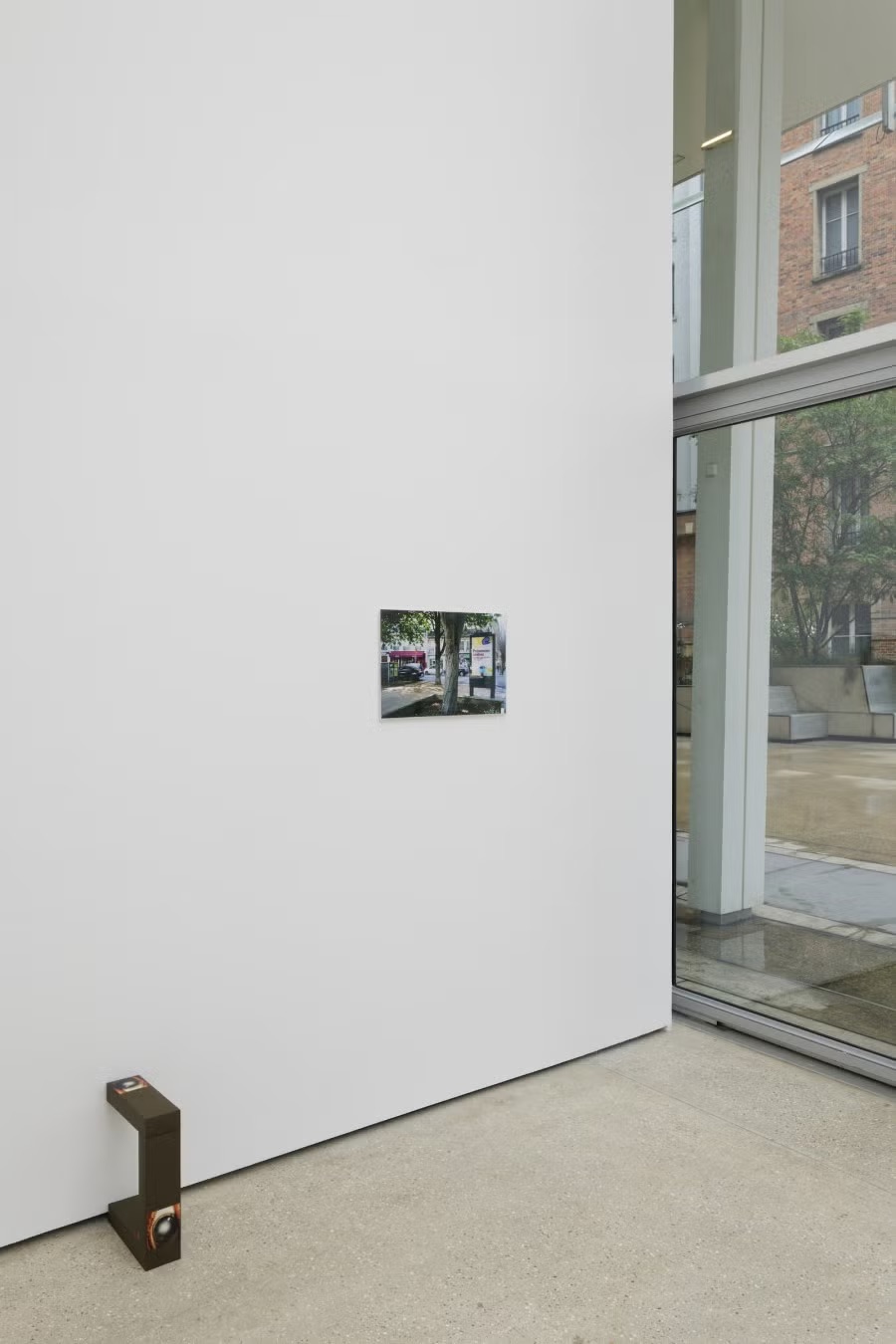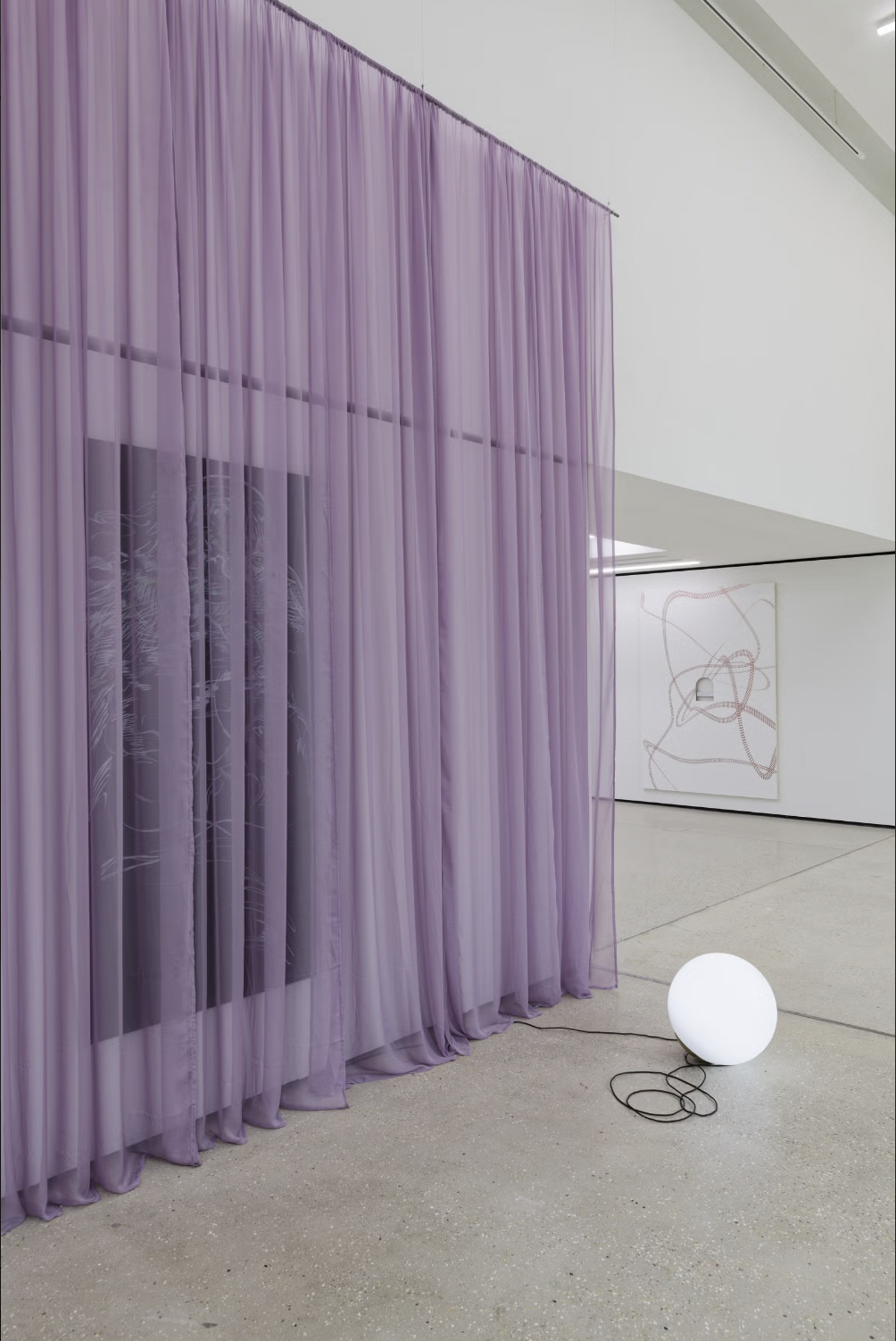











All The Messages Are Emotional
(- After Lauren Berlant)
25th Prix Fondation Pernod Ricard with Clémentine Adou, Madison Bycroft, HaYoung, Charlotte Houette, Lenio Kaklea, Paul Maheke and Mona Varichon
* From September 9th to October 31st, 2024.
︎ documentation FR/EN
︎ publication FR/EN
︎ video presentation FR
︎ announcement
︎ presskit
La première image qui m’est apparue à la suite de l’invitation afin d’assurer le commissariat du vingt-cinquième Prix Fondation Pernod Ricard, c’est un émoticône inscrit sur un mur du métro new-yorkais. Il s’agit d’un smiley avec un sourire vers le bas et des yeux en spirale annonçant la fin des conflits émotionnels à travers ces quelques mots : « Emotional conflicts, last day here ! » Dans quelles mesures, l’étude des conflits et plus généralement des émotions au cœur de ces tensions permettraient de mieux appréhender notre monde en mutation. Si le conflit n’est pas une agression (1), alors comment défaire ce nœud qui se forme à chaque fois que nous rencontrons une dissonance affective ou que nous devons affronter une aggravation brutale de notre état chronique perpétuellement en crise ? Voilà en partie les questions qui m’ont traversé l’esprit à ce moment-là et qui continuent de m’habiter en ce début d’année. Selon Ann Cvetkovich (CA, 1957), le terme « affect » désigne autant un problème conceptuel qu’une chose tangible. En tant que tel, il est mieux compris comme un terme générique qui inclut des mots apparentés et plus familiers tels que « sentiment » ou « émotion », induisant par ailleurs le mouvement ainsi que les efforts déployés pour établir une distinction entre eux. (2) L’émotion impliquerait donc l’idée de mouvement et ce dès son origine linguistique jusqu’à sa réalité plastique. Pour autant, elle semble échapper à toute tentative de définition institutionnelle ou académique afin de circuler librement entre les corps. L’affect comme l’émotion n’est à l'intérieur de rien, il n’est pas non plus à l'extérieur. L’émotion comme l’affect repose sur une exploration sociale qui efface la distinction privé/public et annonce à travers cette disparition, une forme d’élocution voire d’émancipation à venir. Les affects tout comme les émotions et même les sentiments sont des faits. (3) Ils sont par là même aussi denses que complexes, car toujours situés, interpersonnels et incarnés. De telle sorte qu’ils existent à travers un phénomène de transmission ou plutôt un ensemble de transferts opérés d’un corps à un autre, d’un mouvement à un autre, d’un objet à un autre. Figure incontournable de la phénoménologie queer, Sara Ahmed (UK, 1950) hésite à utiliser le terme « affect » tant celui-ci est au cœur d’un tournant scientifique à la fin des années 1990. Elle s’intéresse davantage à l’émotion en tant que synonyme de mouvement mais aussi en tant que mot largement utilisé au quotidien. (4) Elle ajoute que ce sont les objets de l'émotion qui circulent, plutôt que l'émotion en tant que telle. (5) Alors, comment reconnaitre ces objets dérivés de l’émotion ? Et dans quelle mesure les réunir pourrait constituer et/ou motiver le point de départ d’une exposition ? Je ne saurais répondre pour l’instant, mais j’ai la certitude que lors des prochains mois, nous parlerons ensemble, avec joie et enthousiasme, de la possibilité de réaffecter des formes post-minimalistes, du vivant photosensible et d’existence extra-ovarienne, de nouvelles narrations féministes et science-fictionnelles, de collecte de gestes affectés au sein d’une ambitieuse encyclopédie pratique de la danse, de réalités et subjectivités post-binaires, du corps performant telle une archive vivante à décoloniser et enfin de la traduction comme action politique et pourquoi pas sentimentale. Autant de spéculations qui laissent présager une exploration collective de l’affect, en dehors de tout lieu commun, porteur en ce sens de nouvelles expériences sociales. À travers sa contribution majeure à la théorisation des affects, Lauren Berlant (USA, 1957 – 2021) a constitué un témoignage fondamental de l’exploitation mais aussi de la marchandisation des affects dans le contexte néolibéral particulièrement agressif et capitalocène de l’Amérique du nord. À travers une syntaxe exigeante, iel convoque une suite de concepts largement inexplorés tels que l’abandon, le désir, l’amour, l’épuisement, la réparation, l’attrition d’un fantasme de vie investie collectivement : « the good life ». (6) Sa pensée accompagne ce projet qui résonne par ailleurs comme l’occasion idéale de traduire un de ses essais jusqu’alors inédit en langue française. Inspiration directe, iel donne aussi les premières intentions de cette recherche à travers l’annonce de son titre : « Tous les messages sont émotionnels ».
1. Sarah Schulman, Le Conflit n’est pas une agression, rhétorique de la souffrance, responsabilité collective et devoir de réparation, Éditions B42, 2021.
2. Ann Cvetkovich, Affect. In B. Burgett & G. Hendler (Eds.) Keywords For American Cultural Studies (pp. 13–15). New York and London, NYU Press, 2007.
3. Yvonne Rainer, Feelings are Facts: A Life, MIT Press, 2006.
4. Affect/Emotion: Orientation Matters, A Conversation between Sigrid Schmitz and Sara Ahmed, Freiburger Zeitschrift für GeschlechterStudien, Budrich Unipress, 2014.
5. Sara Ahmed, The Cultural Politics of Emotion, Edinburgh University Press, 2004.
6. Lauren Berlant, Cruel Optimism, Duke University Press, 2011.
Toutes les vues d’exposition, courtesy les artistes, photo © Aurélien Mole, 2024.
(- After Lauren Berlant)
25th Prix Fondation Pernod Ricard with Clémentine Adou, Madison Bycroft, HaYoung, Charlotte Houette, Lenio Kaklea, Paul Maheke and Mona Varichon
* From September 9th to October 31st, 2024.
︎ documentation FR/EN
︎ publication FR/EN
︎ video presentation FR
︎ announcement
︎ presskit
La première image qui m’est apparue à la suite de l’invitation afin d’assurer le commissariat du vingt-cinquième Prix Fondation Pernod Ricard, c’est un émoticône inscrit sur un mur du métro new-yorkais. Il s’agit d’un smiley avec un sourire vers le bas et des yeux en spirale annonçant la fin des conflits émotionnels à travers ces quelques mots : « Emotional conflicts, last day here ! » Dans quelles mesures, l’étude des conflits et plus généralement des émotions au cœur de ces tensions permettraient de mieux appréhender notre monde en mutation. Si le conflit n’est pas une agression (1), alors comment défaire ce nœud qui se forme à chaque fois que nous rencontrons une dissonance affective ou que nous devons affronter une aggravation brutale de notre état chronique perpétuellement en crise ? Voilà en partie les questions qui m’ont traversé l’esprit à ce moment-là et qui continuent de m’habiter en ce début d’année. Selon Ann Cvetkovich (CA, 1957), le terme « affect » désigne autant un problème conceptuel qu’une chose tangible. En tant que tel, il est mieux compris comme un terme générique qui inclut des mots apparentés et plus familiers tels que « sentiment » ou « émotion », induisant par ailleurs le mouvement ainsi que les efforts déployés pour établir une distinction entre eux. (2) L’émotion impliquerait donc l’idée de mouvement et ce dès son origine linguistique jusqu’à sa réalité plastique. Pour autant, elle semble échapper à toute tentative de définition institutionnelle ou académique afin de circuler librement entre les corps. L’affect comme l’émotion n’est à l'intérieur de rien, il n’est pas non plus à l'extérieur. L’émotion comme l’affect repose sur une exploration sociale qui efface la distinction privé/public et annonce à travers cette disparition, une forme d’élocution voire d’émancipation à venir. Les affects tout comme les émotions et même les sentiments sont des faits. (3) Ils sont par là même aussi denses que complexes, car toujours situés, interpersonnels et incarnés. De telle sorte qu’ils existent à travers un phénomène de transmission ou plutôt un ensemble de transferts opérés d’un corps à un autre, d’un mouvement à un autre, d’un objet à un autre. Figure incontournable de la phénoménologie queer, Sara Ahmed (UK, 1950) hésite à utiliser le terme « affect » tant celui-ci est au cœur d’un tournant scientifique à la fin des années 1990. Elle s’intéresse davantage à l’émotion en tant que synonyme de mouvement mais aussi en tant que mot largement utilisé au quotidien. (4) Elle ajoute que ce sont les objets de l'émotion qui circulent, plutôt que l'émotion en tant que telle. (5) Alors, comment reconnaitre ces objets dérivés de l’émotion ? Et dans quelle mesure les réunir pourrait constituer et/ou motiver le point de départ d’une exposition ? Je ne saurais répondre pour l’instant, mais j’ai la certitude que lors des prochains mois, nous parlerons ensemble, avec joie et enthousiasme, de la possibilité de réaffecter des formes post-minimalistes, du vivant photosensible et d’existence extra-ovarienne, de nouvelles narrations féministes et science-fictionnelles, de collecte de gestes affectés au sein d’une ambitieuse encyclopédie pratique de la danse, de réalités et subjectivités post-binaires, du corps performant telle une archive vivante à décoloniser et enfin de la traduction comme action politique et pourquoi pas sentimentale. Autant de spéculations qui laissent présager une exploration collective de l’affect, en dehors de tout lieu commun, porteur en ce sens de nouvelles expériences sociales. À travers sa contribution majeure à la théorisation des affects, Lauren Berlant (USA, 1957 – 2021) a constitué un témoignage fondamental de l’exploitation mais aussi de la marchandisation des affects dans le contexte néolibéral particulièrement agressif et capitalocène de l’Amérique du nord. À travers une syntaxe exigeante, iel convoque une suite de concepts largement inexplorés tels que l’abandon, le désir, l’amour, l’épuisement, la réparation, l’attrition d’un fantasme de vie investie collectivement : « the good life ». (6) Sa pensée accompagne ce projet qui résonne par ailleurs comme l’occasion idéale de traduire un de ses essais jusqu’alors inédit en langue française. Inspiration directe, iel donne aussi les premières intentions de cette recherche à travers l’annonce de son titre : « Tous les messages sont émotionnels ».
1. Sarah Schulman, Le Conflit n’est pas une agression, rhétorique de la souffrance, responsabilité collective et devoir de réparation, Éditions B42, 2021.
2. Ann Cvetkovich, Affect. In B. Burgett & G. Hendler (Eds.) Keywords For American Cultural Studies (pp. 13–15). New York and London, NYU Press, 2007.
3. Yvonne Rainer, Feelings are Facts: A Life, MIT Press, 2006.
4. Affect/Emotion: Orientation Matters, A Conversation between Sigrid Schmitz and Sara Ahmed, Freiburger Zeitschrift für GeschlechterStudien, Budrich Unipress, 2014.
5. Sara Ahmed, The Cultural Politics of Emotion, Edinburgh University Press, 2004.
6. Lauren Berlant, Cruel Optimism, Duke University Press, 2011.
Toutes les vues d’exposition, courtesy les artistes, photo © Aurélien Mole, 2024.
The first image that appeared to me after the invitation to organise the twenty-fifth Prix Fondation Pernod Ricard was an emoji on a wall of the New York subway. It was a smiley with a downturned mouth and eyes in spirals announcing the end of emotional conflicts with these few words: “Emotional conflicts, last day here!” To what extent does the study of conflicts and, broadly speaking, of the emotions at the heart of these tensions allow us to better understand our changing world? If the conflict is not an attack, (1) then how do we undo this knot that forms every time we encounter affective dissonance or must confront a brutal aggravation of our chronic state of perpetual crisis? These are some of the questions that crossed my mind at the time and continue to linger into this new year. According to Ann Cvetkovich (CA, 1957), the term “affect” refers as much to a conceptual problem as to something tangible. As such, it is best understood as a generic term that includes similar and more familiar words such as “feeling” or “emotion”, also spurring the movement and efforts deployed to establish a distinction between them. (2) Emotion would therefore imply the idea of movement and that goes for everything from its linguistic origins to its plastic reality. All the same, it seems to escape any attempt at an institutional or academic definition in order to circulate freely between bodies. Like emotion, affect is not inside anything nor is it outside of anything. Emotion and affect are both based on a social exploration that erases the private/public distinction and announces, through this disappearance, a form of future elocution or emancipation. Affects, like emotions and even feelings, are facts. (3) In that sense they are just as dense as they are complex, because they are always situated, interpersonal and embodied. In such a way that they exist through a phenomena of transmission, or rather, a series of transfers operated from one body to another, one movement to another, one object to another. An indispensable figure of queer phenomenology, Sara Ahmed (UK, 1950) hesitates to use the term “affect” since it was so integral to a scientific watershed in the late 1950s. She is more interested in emotion as a synonym of movement but also as a word largely used in everyday life. (4) She adds that it is the objects of emotion that circulate, rather than the emotion itself. (5) So how do we recognise these derivative products of emotion? And to what extent would bringing them together constitute and/or motivate the starting point of an exhibition? I am not able to answer just yet, but I am certain that in the months to come we will joyfully and enthusiastically discuss the possibility of re-affecting post-minimalist forms, about photosensitive living organisms and extra-ovarian existence, new feminist and science-fictional narratives, a collection of affected gestures in an ambitious practical encyclopaedia of dance, post-binary subjectivities and realities, the performative body as a living archive to be decolonised, and finally, translation as a political action and even a sentimental one. All kinds of speculation that allow us to envisage a collective exploration of the affective realm, beyond clichés, and thus the harbingers of new social experiences. Through their major contribution to the theorising of affects, Lauren Berlant (USA, 1957–2021) constituted a fundamental witness of exploitation but also of the commodification of affects in the particularly aggressive neoliberal context of North America in the Capitalocene. Through a rigorous syntax, they convoke a series of largely unexplored concepts such as abandonment, desire, love, exhaustion, redress and the attrition of a fantasy of life collectively invested: “the good life”. (6) Their thinking guides this project, which resonates as the ideal chance to translate one of their essays, never before published in the French language. A direct inspiration, they also provide the primary intentions of this research through the announcement of its title: “All the Messages Are Emotional”.
1. Sarah Schulman, Le Conflit n’est pas une agression, rhétorique de la souffrance, responsabilité collective et devoir de réparation (Éditions B42, 2021).
2. Ann Cvetkovich, “Affect” in B. Burgett & G. Hendler (eds.) Keywords For American Cultural Studies (New York and London: NYU Press, 2007),13–15.
3. Yvonne Rainer, Feelings are Facts: A Life (Cambridge: MIT Press, 2006).
4. Affect/Emotion: Orientation Matters, A Conversation between Sigrid Schmitz and Sara Ahmed (Freiburger Zeitschrift für GeschlechterStudien, Budrich Unipress, 2014).
5. Sara Ahmed, The Cultural Politics of Emotion, (Edinburgh: Edinburgh University Press, 2004).
6. Lauren Berlant, Cruel Optimism (Duke University Press, 2011).
All the exhibition views, courtesy the artists, photo © Aurélien Mole, 2024.